Public finance woes put pressure on PM candidates space

A record £19.4 billion interest payment on the nation’s debt in June is a timely reminder that the tax-cutting offer at the top of Liz Truss’s Prime Ministerial prospectus is rightly open to scrutiny and scepticism.
Index-linked gilts have been a major part of the Treasury’s fund raising armoury for more than four decades and account for around a quarter of the outstanding sum.
Margaret Thatcher’s then Chancellor Sir Geoffrey Howe began issuing them to meet demand from investors just at around the time inflation was reaching a peak it has not since matched — until now.
Unlike a credit card the interest payments do not have to be paid at the end of this month, thank goodness, but accrue until the bonds are repaid. But repaid they will have to be, mostly long after the current crop of politicians have left the stage.
And today’s worse than expected public finance figures do throw into sharp relief the alternative economic priorities of the two candidates to be the next Prime Minister: Rishi Sunak and Liz Truss.
Sunak’s sound money priority during his tenure as Chancellor was the reason for the tin-eared Spring Statement that seemed to offer little help to those suffering most from the cost-of-living crisis.
It was that mistake that allowed his rivals to paint him, bizarrely, both as a tax-and-spend socialist and a technocrat out of touch with ordinary voters.
Poor marks for presentation, but as today’s figures show, his instinct was right.

 Yahoo Finance
Yahoo Finance 